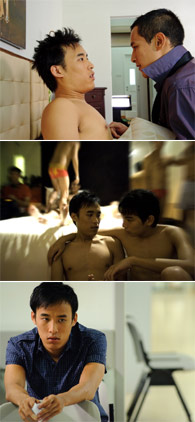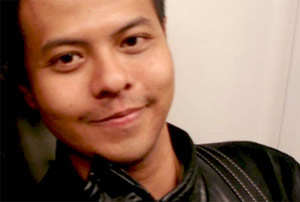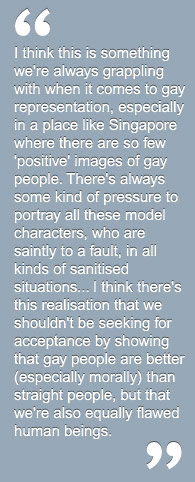Anniversary, a short film directed by Royston Tan and written by Alfian Sa’at, has been rated R21 without cuts by the censors and will have its premiere at the Love fundraising dinner organised by Action for AIDS (AFA) on Dec 4. 2009.

The 20-min film delves into the lives of Wai Kit, a 23-year-old undergrad who lives with his 27-year-old insurance agent boyfriend, Justin, as they approach their first anniversary with differing expectations and values shaped by their earlier relationship experiences. While Justin is described as being “remarkably idealistic, believing in the virtues of monogamy,” Wai Kit has been “in and out of relationships”. To complicate matters, Justin’s participation at a ‘party-and-play’ session just months before meeting Justin comes back to haunt him.
Commissioned by AFA, the film touches on the issue of ‘chemsex’ where 'sex-enhancing' drugs are used by a certain segment of the gay community.
Alfian, an acclaimed poet and playwright who is best known for his Asian Boys Trilogy, says the film hopes to “address a certain problem within the gay community.”
“You can go to a local IRC channel, and you'll see how many nicknames have the words 'chem' or 'wild' appended to them. So we thought it's time to bring this into the open, and have a real discussion about it. Because the more you pretend it doesn't exist, the more you grant it an underground status, and then people go into denial mode.
“And the minute you go into denial, then you start to forget how these things you do in the shadows, in secret, can have such profound consequences on the life that you lead in broad daylight,” he added.
A public screening of the film is being planned for mid-December. To book a seat or receive updates, sign up at anniversary.sg.
Resident Playwright with W!ld Rice, and the writer of the Asian Boys Trilogy Alfian Sa’at explains why the potentially controversial themes of the film are needed and how the Singapore censors’ practice of rating homosexual content on the basis that it will ‘promote’ homosexuality is just “idiotic.”

æ: Anniversary has been passed uncut with a R21 rating. Is this what you’d expected and do you think this is the best case scenario given the subject matter?
Alfian: I think this whole policy of rating homosexual content on the basis that it will 'promote' homosexuality is idiotic. There's no other word for it. It frames every film that's either got gay characters, or deals with gay issues, as a recruitment video. I don't know where's the evidence for this – that watching gay people depicted in media will turn you gay! And of course what's been happening is that any form of representation is, in their books, already considered 'promotion'. That you're advocating for people to adopt the 'homosexual lifestyle'. That's like saying that if I'm wearing a T-shirt in public I'm telling everyone to go and buy it.
The other thing is this whole notion of having a multi-tiered ratings system. The Media Development Authority (MDA) loves to promote this using a classic capitalist argument – more options means more choice for the consumer. So we have a bewildering total of five ratings – R21 (no patrons under 21), M18 (no patrons under 18), NC16 (no children under 16), PG (parental guidance) and G (for general audiences). But the truth is the consumer doesn't really have more choice – the censors ultimately choose what he or she gets to watch. When you have this kind of multi-tiered system, decisions actually become very arbitrary – what separates an R21 from an M18 film, for example? How do you operationalise this? I wouldn't be surprised if distinctions are made based on how long a sex scene is, for example: less than 30 seconds – M18, more than that, R21. As if duration defines the magnitude of the 'sexual.'
In a way, I'd expected the rating from MDA. And this isn't because I know exactly what the lines of transgression are. I expected an R21 rating simply because we're dealing with gay content here – and they're stricter on gay content within a Singaporean context, because this might suggest that homosexuality might be an indigenous phenomenon, and not something copied and imported from the West.
My stand on censorship is quite simple: protect minors. And what they need to be protected from is excessive and gratuitous sexual and violent content. This is because there might be some correlation between prolonged exposure to such content and potentially sociopathic behavior – even though the jury's still out and the whole discourse is contaminated by all the supposed controversies surrounding media effects and moral panic.
They should also get rid of all that bureaucratic multi-tiering. It's easier to decide on which side a film lies on if you just have a single threshold. And the maximum age should be lowered from 21 to 18 – the male population is mandatorily conscripted at 18, and if you're old enough to be trained to kill people using government-issued weapons, then you're old enough to see breasts or cocks on screen. Because otherwise then MDA is saying that the state is recruiting child soldiers, right?
I think film censorship in Singapore is in need of urgent reform. Because it's not just about protecting minors any more, but has extended to censors arrogating themselves the duty of supposedly purging the media landscape of 'spiritual pollution'. Censorship has become this thing where people are occupying seats of influence and see themselves as God's servants instead of civil servants. And civil servants should be people who, first and foremost, serve the interests of the public and a secular state.
æ: What inspired the gay orgy & drugs story idea? The first thought some people might have would be that this film would reinforce the gay-sex-drugs stereotype about gay relationships / people, so why choose to portray this part of life?

Alfian: I think this is something we're always grappling with when it comes to gay representation, especially in a place like Singapore where there are so few 'positive' images of gay people. I think every gay community in every country goes through this phase. There's always some kind of pressure to portray all these model characters, who are saintly to a fault, in all kinds of sanitised situations.
But I think the ground has shifted. In the mid-90s you had New Queer Cinema – with people like Tom Kalin, Todd Haynes, Gregg Araki being very unapologetic with a warts-and-all depiction of gay people. And of course by the turn of the millennium you had Queer As Folk – which brought gay subculture into the mainstream, without capitulating to 'mainstream values'.
I see this happening in Singapore too. As early as 2003 Haresh Sharma was writing a play like Mardi Gras – where some of the gay characters weren't begging to be loved by the audience. And then Johann Lee's series of novels also evolved from the almost sex-negative milieu in Peculiar Chris (1992) to a frank exploration of an open relationship in Quiet Time (2008). Cyril Wong was writing poems where gay characters had AIDS. Loo Zihan's films, like his short 'untitled' (2005) and feature Solos (2007) had gay characters engaged in furtive, mechanical sexual encounters. I think there's this realisation that we shouldn't be seeking for acceptance by showing that gay people are better (especially morally) than straight people, but that we're also equally flawed human beings.
What we're trying to do in Anniversary is address a certain problem within the gay community, and that is the use of supposedly 'sex-enhancing' drugs. You can go to a local IRC channel, and you'll see how many nicknames have the words 'chem' or 'wild' appended to them. So we thought it's time to bring this into the open, and have a real discussion about it. Because the more you pretend it doesn't exist, the more you grant it an underground status, and then people go into denial mode. And the minute you go into denial, then you start to forget how these things you do in the shadows, in secret, can have such profound consequences on the life that you lead in broad daylight.
That said, the 'drug orgy' thread is only one facet of the film. There is also a depiction of a stable, monogamous gay relationship. We're not a homogenous community, and even though Anniversary is a short film, I hope it's managed to touch on the spectrum that's out there.
æ: What do you hope for viewers to take home?
Alfian: We're telling the story of a relationship, and the kinds of trials the people in it undergo. Royston's a wonderful visual storyteller, whereas as a playwright I'm much more verbal (you can tell from this interview!), and he's managed to strip down some of my bad habits. There's a lot of things you can take from the film – anything from the aesthetic aspects like the cinematography to the sensitive performances by the actors. I don't believe in messages, but I think the film's more than something that explores what it means to be in a gay relationship. I hope one of the questions it provokes is that very universal one: do we trust someone because we love him, or do we love someone because we trust him?
A public screening of the film is being planned for mid-December. To book a seat or receive updates, sign up at anniversary.sg.

